
09.26.18
-David Mitchell
My life amounts to no more than one drop in a limitless ocean. Yet what is any ocean, but a multitude of drops?
Soaked Lions
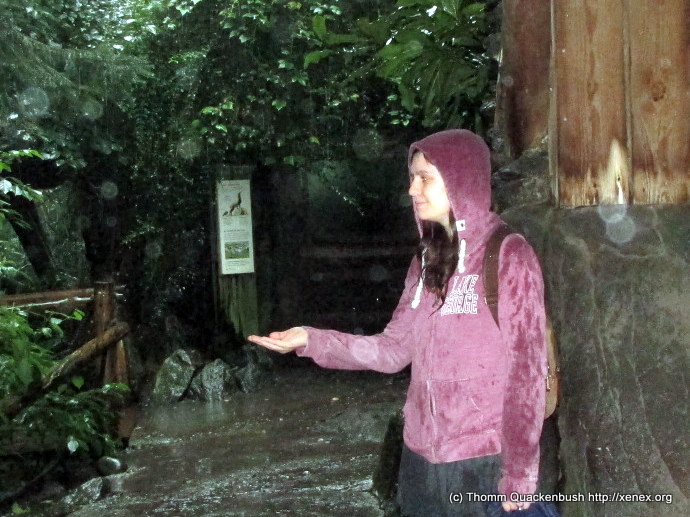
I come upstairs, three layers between the elements and my skin. Already, I worried I might overheat. I pulled at the fabric to determine which would win in a contest between weight, heat retention, and water-proofness.
Amber, still in her robe, spoon-feeding our cat because she thinks without much evidence that she has to (though he does enjoy being served), gives me a cursory appraisal. "I guess you don't have any pants that aren't jeans."
"Like what?" I have slacks, my teacher drag, but I do not consider them appropriate to casual occasions.
"Like leggings," she answers as if is the most obvious conclusion one could draw. "Once you get wet, you are going to be wet all day."
There is no wiggle room in her prophecy.
In the week prior, the forecast for today was slightly overcast. Sunday, that forecast shifted to "Rain, all day, sometimes heavy." It didn't seem worth the wasted hope that meteorologists would recant this evident blasphemy.
Rain all day and we are going to the Bronx Zoo for a team building exercise with Amber's job. Spouses and children are welcome, though I don't suppose we are on the team as much as ways to ensure more employees attend. Given the choice between the zoo and teaching juvenile delinquents science, even a saturated zoo wins. At worst, I come away from with pneumonia, the disgust of her coworkers, and a story -- and how likely are two-thirds of that, really?
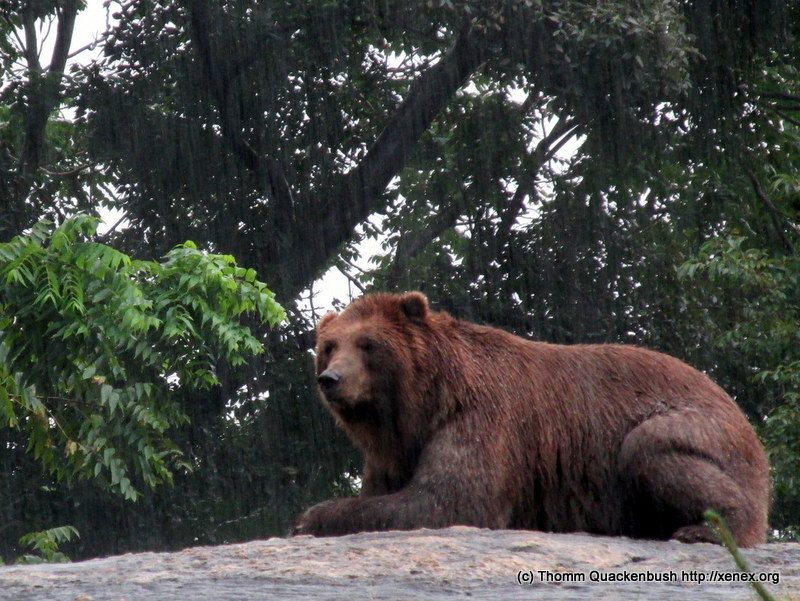
For her attendance, the animal hospital pays Amber four hours wages, a good deal, all things considered.
We gather in the hospital, where I try to remember with little success who is whom. The last time I had any contact with any of them, I was distraught. My new kitten had been diagnosed with feline leukemia. I barely remembered who I was. I assume, as consummate professionals, they can forgive me any potential lapse in memory.
I quiz Amber about names. She can give the titles of some -- obviously, I donít have to ask what the doctors do -- and am not dissatisfied that she is fuzzy as to some of the specifics. One assumes that a hospital has dedicated staff, but there seems to be too many people. I tend not to imagine the people with whom Amber works. They are a faceless other, a place she is when she is not with me. I doubt she could recognize any of my coworkers and I unconsciously extend to her that courtesy.
I do not often witness Amber outside a context familiar to me, one that is hers exclusively. Most of our friends are mutual and we prefer the buffering company of one another in social situations.
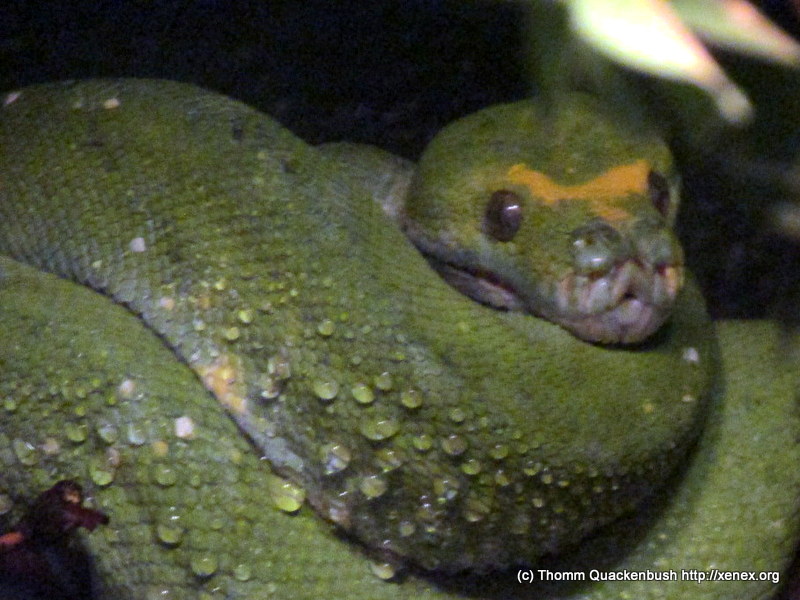
At the hospital, Amber bounces about, checking this or that bit of work, though the office is closed today. This is a day entirely for the zoo. No one will remain here.
It feels transgressive to be here in the pre-dawn, even the sound of the boarded pets muted, like those rare occasions I was in schools long after hours. There is the air of an underground party or mild breaking-and-entering.
The hospital has chartered a coach bus and provides not only admission, but lunch and dinner to boot. In the sun, this trip would be paradisiac. In the rain, it is least an experience to which I am asked to contribute nothing but my presence and a personal day at work, a sacrifice I am only too happy to make.
On the ride down, Amber cuddles against me, not bothering with conversation, mostly speaking to me to repeat the question of a man walking down the aisle, asking if I want a turkey sandwich or a veggie one, a Coke or a Sprite. Someone hands a DVD up the row and, before we are much into our journey, we are watching Moana try to coax Maui onto her boat to restore the heart to Ta Fiti. These songs nestle in my ear for the rest of the day. To whomever subjected me to this, what can I say except you're welcome for keeping my mouth shut through the film?
The rain is almost an asset because we do not want to separate much. Amber adheres to a coworker and friend, Bonnie, a short haired and bespectacled woman, who is only too happy to use her mantle as leader to get us out of the rain and into a mouse house. As Iím only an accessory to this experience, not its intended audience, I am only too happy to be led. I have nothing to lose here if interactions turn sour, and I lack the internal compass today to notice or care about social gymnastics. I understand that these forty people are my tribe and, too, that there are few people at the zoo today who are not members of it. It is as though the place has been left abandon to our use. I would struggle after to name even a tenth of them -- there is Bonnie, the Leader Who Once Had a Job Distracting Fish; Dr. G, the younger doctor who saw our first cat; Dr. D, who told us out second cat has feline leukemia; Kevin, who has Shiba Inu on his shirt; Tom, who handed out sandwiches -- but they have all been assigned the role of temporary friends.
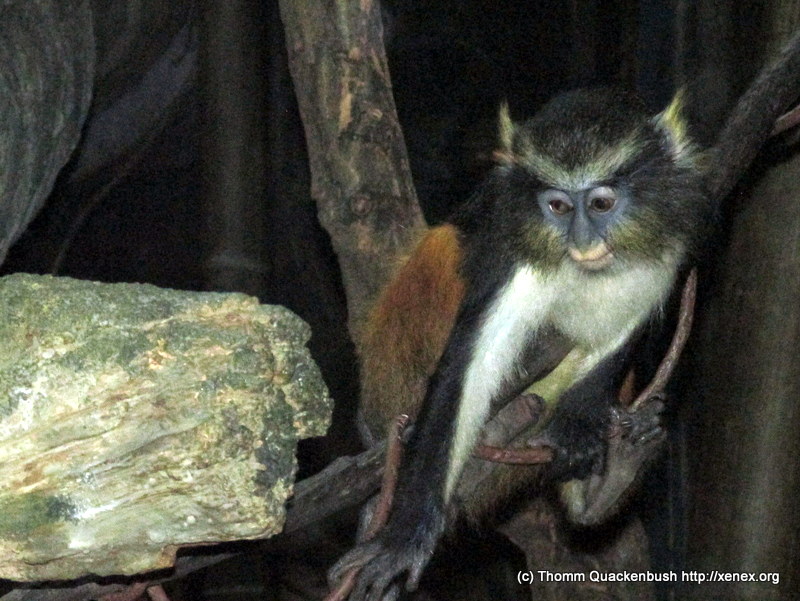
We have a carefully planned schedule with required meetups, a glossy printout in a folder. Given the rain, most of the plan is scratched, aside from meeting up for meals.
A man I take to be one of the owners of the hospital snarks that, by lunch, they have only had seven emergency calls, with nineteen additional messages, even though it was made explicit that the hospital would be closed today and the message on the voice mail said as such.
Over lunch, those who managed to meet at the abandoned kiosk try to seduce peacocks into friendship with bits of sandwich. There is no staff to tell us not to. As these birds populate lion and tiger enclosures, they have little fear of hairless apes.
We find others of our crew, seeming more like drown rats than the actual rodents, and seek shelter in the jungle enclosure, indoors and warm, though humid. Within sit students from some art school, sketching and painting the animals who cared to come out of their burrows and nests. When I focus my camera on a clutch of bats, one of the students springs up to lecture me both on proper technique for my point-and-click and the importance of respecting bats. I thanks him in a terse way, assuring him I was managing both when he was a zygote.
We linger over the primates. On an enclosure with cracked glass is affixed a sign asking us not to worry because this ten-foot spiderweb was caused by a monkey using a rock to try to get out (a statement less reassuring was intended; the monkeys have figured out both tools and range weapons). There are two adult monkeys who, in their reaction to a hyperactive one literally jumping at the window to play with the vet techs, are surely its long suffering parents. I have no doubt who wielded the destructive rock and why. In the smaller monkeyís eagerness, I wonder if it is going to resort to an improvised battering ram.
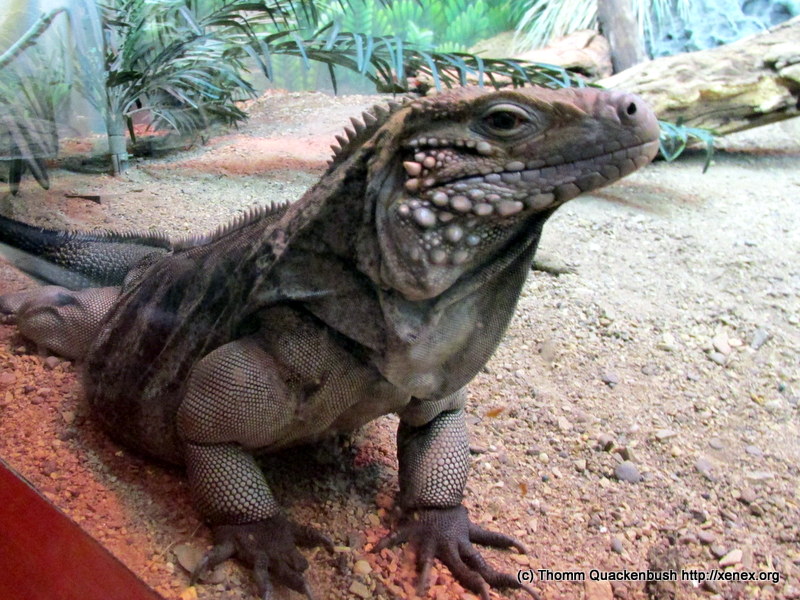
The vet techs settle here, taking off the load of bags and outerwear. I drop mine next to them, assuming rightly that they are enough my pack that they will guard it. Even if they didn't, the zoo is so uninhabited that I have little worry of theft. In fact, I realize I neglected to pick my backpack up after twenty minutes and back track, unsurprised that it in beneath the seat of some vaguely familiar woman who I do not remember, but who smiles at me without pressing me for the password of her name.†
Given the daily proximity to pets, all of these women -- the hospital is mostly staffed by women -- coo over everything animate. A jungle cat triple their weight is merely an overgrown kitten in need of affection. The unlovable hyena, an animal one would never want to encounter without a fence and Plexiglas between, is a cute puppy (with, they are keen to note, a pseudopenis that must made childbirth especially ghastly). They see the natural world with a soft benevolence that make sense given how often they are the only thing standing between an animal and death.
Everything gets wet. Our phones buzz, warning of flash floods. Enclosures bordered by Plexiglas -- or whatever hopefully stronger alloy is used -- fill with water wherever the ground dips, putting a foot or more of water into the space. I am impressed at the number of large animals that rest in the pouring rain, despite looking miserable.
Nearing the end of the day, we are assigned to team to complete a digital scavenger hunt. Not long ago, this would have panicked me, but I feel no social awkwardness. I donít know if it is situational, chemical, or psychological, but I donít examine it too closely. I can participate blithely, which is itself an accomplishment. (We also win because I am not about to slack in a scavenger hunt.)
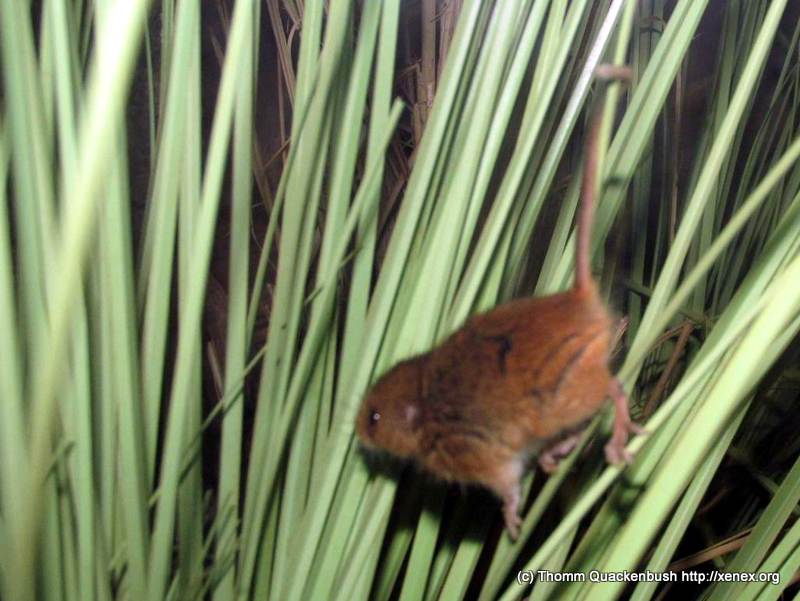
By the end of the day, I have trod around nine miles, which would feel like more a badge of honor with a dry pair of socks.
We assemble in the vacant dining room, our conversations as dampened as our clothing. It is late enough that the cafť is closing. I donít know how we will be fed, but I would not mind being herded into the bus and going home. I want a dry body more than a fed one.
As we start to whisper worries to one another, someone pops their head out a door and asks why we are waiting out there.
Within is a buffet of sandwiches and salad. I go back for thirds.
Into my first plate of salad and a slice of sandwich, an older man introduces himself as the founder of the hospital, affirming I am Amberís husband. He asks what I do and I am too hungry and frazzled to tell him the cushioned truth, at which point the conversation turns to juvenile justice. His wife and he are concerned, with just a touch of horror for flavor. He later says I probably get bitten more than the vet techs. (I have never been bitten.)
On the bus home an hour later, the lights dim. Most people rest. Amber naps, head on my lap. So restrained, I use my free hand to read on my phone until the bus pulls back into the hospital.
Soon in Xenology: 11/9. Superpowers. Daniel.
last watched: American Horror Story: Cult
reading: It Can't Happen Here
listening: Damien Rice